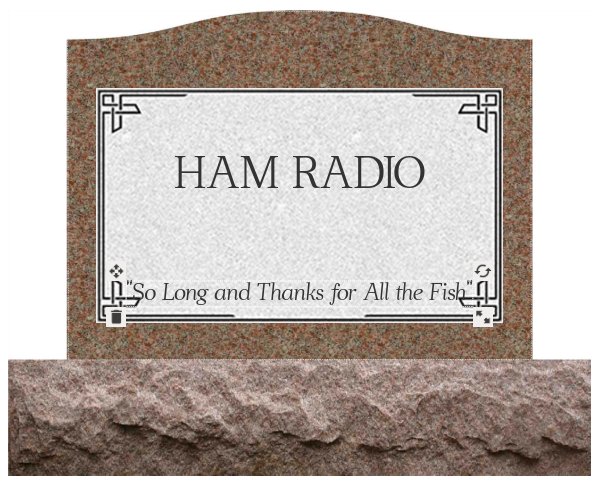
(NOTE: I completed the final draft of this post a week ago prior to yesterdays announcement that the ARRL has nominated a new CEO)
The term “Ham Radio” has an interesting etymology. It started out as early as 1901 as a pejorative to describe landline telegraphers “who lack ability” or “ham fisted” skills with sending a message. While the pejorative persisted into radio telegraphy as late as 1940, Amateur Radio operators adopted the term and turned it into a positive as a description of their hobby and themselves. Over time, the term “Ham Radio” has come to reflect the cultural aspects that have developed around Amateur Radio.
Another term with an interesting etymology is “hack.” It’s root is as “a kind of shortcut or modification—a way to bypass or rework the standard operation of an object or system” focusing on some positive outcome. In the 1980s the term became popularized as a pejorative for gaining access to computing systems with criminal pursuits in mind. In recent years the term has returned as a positive activity applied to problem solving across a variety of mediums. It is plausible to say the maker movement is an offshoot of the hacking culture.
The Maker movement is an extension of the do-it-yourself (DIY) culture that emphasizes learning through doing in a social environment. Since it includes engineering-oriented pursuits, arts and crafts, it promotes democratizing access to STEM and other tech-rich and art domains. There is a rich subculture of “hacker turned maker” working on projects that include electronics, computing, and wireless technologies.
Many of these hackers start their wireless experimentation with WiFi and Bluetooth then move on to unlicensed spectrum such as the Industrial, Science, and Medical (ISM) bands. Much of the wireless technology is low cost and readily accessible. With these “wireless hackers” focusing much of their experimentation in the VHF/UHF bands, getting an Amateur Radio license represents an opportunity for them to access more spectrum using higher power. This could be for operating drones, wireless digital networks as well as a desire to experience contacting satellites or the ISS.
While the Ham Radio and Wireless Hacker communities continue to develop tendrils of collaboration on the global stage of the Internet, the cultures born from their origin stories resemble a “generation gap” when it comes to developing synergies at a local or club level. Amateur Radio clubs struggle
As one of the volunteers that sets up an Amateur Radio station for the Hackers on Planet Earth (HOPE) conference for a dozen years, I would hear stories from hackers who would seek out local Amateur Radio clubs for advice in “getting into the hobby” but would not get advice that was practical or consistent for a beginner.
Hackers tend to focus on “quick wins” first with the least amount of resource and then work backwards into the details of how something works and how small can the components be broken down for maximum modification developing “tribal experience” with the technology and sharing on forums. Hackers recognize they are hearing rich stories of Amateur Radio “tribal experience” but not in context to their beginner level nor relevant to the current state of the art of readily available technology.
When I hosted a workshop at HOPE XII on learning digital modes with cheap readily available gear, I met hackers with Extra class licenses who used their “tickets” for the first time in the workshop. Comments such as “I enjoyed that this was a quick win that got everyone on the air” and “Lot of Hams I have spoken to didn’t get into digital communication because of tedious setup it presumably requires a workshop like this one certainly lowers the bar to entry.”
Amateur Radio clubs have always professed youth is the future of the hobby and engage them via partnerships or shared events with youth organizations. In the past Amateur Radio may have been the only technology exposure but steadily over the past decade youth organizations have had access to far richer and relevant technology experiences through Maker movement relationships and in some cases forming makerspaces/hackspaces.
Another path Amateur Radio clubs try to recruit is hosting Technician Class license classes. But with the readily available resources from the Internet that can get a person ready for the test in 24 hours, clubs need to add significant differentiation in their classes that focus on what you can do with your license once you have it and who else is doing it.
If you are an ARRL member and read QST you see the magazine try to play catch-up with technology monthly assuming role of reluctant follower rather than a leading source for latest wireless technology usable by Amateurs. The term “Ham” has taken on a pejorative again but of a different meaning for disenchanted hackers.
But what is common interest to “Wireless Hackers” and Hams is the preservation and maximization of spectrum for experimentation. This is especially true with spectrum from VHF through SHF. The common threat to this spectrum is 5G. In the past spectrum threats sooner benefited commercial business than trickle down in tangible value to the average consumer. 5G promises to deliver to the “needs of the many” rather than “needs of the few” and more than likely via brands consumers relate to like Amazon and Google with telco’s in the fabric of the infrastructure. Verizon FiOS already makes 5G routers available in the home.
For now, the ARRL needs to concede “state of the art” to the “wireless hacker” community and focus on spectrum protection for all (licensed and unlicensed.) From this platform a new foundation can be formed where “state of the art” evolves organically as a joint effort among stakeholder communities in RF spectrum that include ordinary technology users unifying into a future Amateur Radio community.
For what its worth,
Joe, NE2Z
PS: I encourage you to review some material I went through in preparation of this post
- Etymology of Ham Radio
- https://en.wikipedia.org/wiki/Etymology_of_ham_radio
- A Short History of “Hack”
- https://www.newyorker.com/tech/annals-of-technology/a-short-history-of-hack
- Maker Culture (Wikipedia)
- https://en.wikipedia.org/wiki/Maker_culture
- The History of Amateur Radio
- http://www.astrosurf.com/luxorion/qsl-ham-history.htm
- Amateur Radio: 100 Years of Discovery http://www.arrl.org/files/file/About%20ARRL/Ham_Radio_100_Years.pdf
- American Radio Relay League
- http://arrl.org
- AMSAT
- https://www.amsat.org/
- Reddit – Amateur Radio
- https://www.reddit.com/r/amateurradio/
- Hackaday – Amateur Radio Articles
- https://hackaday.com/tag/amateur-radio/
- DEFCON 24 Wireless Village – I Amateur Radio and So Can You (Kat Sweet) https://www.youtube.com/watch?v=iP_s0fFrf8M
- DEFCON 16 Ham for Hackers (JonM)
- https://www.defcon.org/images/defcon-16/dc16-presentations/defcon-16-jonm.pdf
- ICQ Amateur/Ham Radio Podcast: Grow, Merge, or Disband your Amateur Radio Club https://www.icqpodcast.com/download-the-show/2019/10/27/icq-podcast-episode-310-grow-merge-or-disband-your-amateur-radio-club

